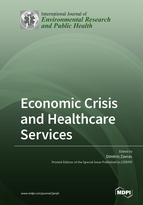Economic Crisis and Healthcare Services
A special issue of International Journal of Environmental Research and Public Health (ISSN 1660-4601). This special issue belongs to the section "Health Economics".
Deadline for manuscript submissions: closed (31 May 2022) | Viewed by 36924
Special Issue Editor
Interests: socioeconomic impact of COVID-19; access to healthcare; healthcare services utilization; healthcare provider choice; unmet healthcare needs; catastrophic health spending; health status measurement; health services research; impact of economic crises on healthcare
Special Issues, Collections and Topics in MDPI journals
Special Issue Information
Dear Colleagues,
Economic crises cause sudden decreases in disposable income and the purchasing power of salaries and well-documented reductions in living conditions. They deplete public finance resources, including in healthcare, harm private business profitability and sustainability, and lead to increased unemployment. In such an environment of generalized uncertainty, healthcare establishments often make restructuring decisions that alter the delivery of care and the ability to care for the most vulnerable.
At the individual level, salary reductions and associated drops in disposable income, unemployment, and loss of insurance coverage all have detrimental effects on the person’s ability to seek affordable, quality, and accessible care. Reduced healthcare affordability coupled with the inability to pay for services results in unmet healthcare needs that have negative consequences on health. Some adverse effects on the population’s physical and psychological health and on overall wellbeing have been documented previously, pointing to the need for more research on the social determinants of health.
At the global level, economic crises challenge healthcare’s ability to provide quality, affordable healthcare services that meet patients’ needs and expectations. The effects seem to be universal, although the severity of the effects does present significant variation. Decision making at the level of the healthcare system becomes more difficult due to increased uncertainty and alternatives which are more difficult to identify. The political landscape of individual countries and the boundaries on which healthcare operates make the comparison of national policies difficult. More discussion is needed along with appropriate analysis of empirical evidence to disentangle the effects of national policies and the identification of best practices.
The healthcare sector, more than any other sector of the economy, has limited margins of error or opportunities for delayed action or reaction. In addition to production goals, its complex governance must satisfy principles of equity, efficiency, effectiveness, and quality. Responding to economic downturns requires reflective, real-time collaboration at the level of policy making between governments, health professionals, researchers, academicians, patients’ communities, and stakeholders. However, this is not an easy task.
Thus, this Special Issue attempts to highlight the mechanisms upon which economic crises affect health, health outcomes, and healthcare-seeking behavior. It documents the need for expeditious and efficient interventions. In addition, it presents the empirical experience from policies that have been implemented to counterbalance the effects of a rapidly slowing economy and critically evaluates their results on health and healthcare. Evidence-based suggestions on the causes, the effects, and the response to the problem are within the scope of this Issue.
Furthermore, this Special Issue focuses on the economic consequences of the COVID-19 pandemic on individuals and households, healthcare providers, and healthcare systems. Decreases in incomes, increases in unemployment, financial uncertainty, reductions in living conditions, and the pressure exerted on healthcare systems are only some of such COVID-19 consequences, indicating humanity’s broad range of challenges attributed to the pandemic.
High-quality scientific and policy papers, both empirical and theoretical, from academicians and researchers are welcomed.
Dr. Dimitris J. Zavras
Guest Editors
Manuscript Submission Information
Manuscripts should be submitted online at www.mdpi.com by registering and logging in to this website. Once you are registered, click here to go to the submission form. Manuscripts can be submitted until the deadline. All submissions that pass pre-check are peer-reviewed. Accepted papers will be published continuously in the journal (as soon as accepted) and will be listed together on the special issue website. Research articles, review articles as well as short communications are invited. For planned papers, a title and short abstract (about 100 words) can be sent to the Editorial Office for announcement on this website.
Submitted manuscripts should not have been published previously, nor be under consideration for publication elsewhere (except conference proceedings papers). All manuscripts are thoroughly refereed through a single-blind peer-review process. A guide for authors and other relevant information for submission of manuscripts is available on the Instructions for Authors page. International Journal of Environmental Research and Public Health is an international peer-reviewed open access monthly journal published by MDPI.
Please visit the Instructions for Authors page before submitting a manuscript. The Article Processing Charge (APC) for publication in this open access journal is 2500 CHF (Swiss Francs). Submitted papers should be well formatted and use good English. Authors may use MDPI's English editing service prior to publication or during author revisions.
Keywords
- economic crises
- income
- unemployment
- health status
- healthcare services
- healthcare affordability
- healthcare seeking behavior
- health policy
- uncertainty
- decision making






